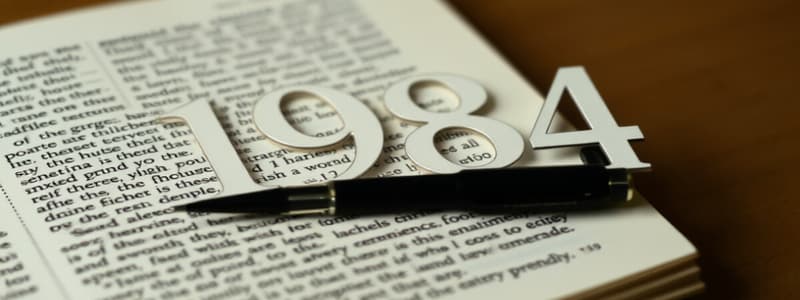Podcast
Questions and Answers
What must sexual urges be repressed for?
What must sexual urges be repressed for?
Fear they will lead to love, human connection, and personal loyalty, which threaten the Party.
Winston believes that love will eventually destroy the Party.
Winston believes that love will eventually destroy the Party.
True (A)
Who betrays Winston?
Who betrays Winston?
- O'Brien
- Both A and B (correct)
- Julia
- Charrington
What does Winston work on at the Ministry of Truth?
What does Winston work on at the Ministry of Truth?
What is Newspeak designed to do?
What is Newspeak designed to do?
What type of society does Orwell warn against in '1984'?
What type of society does Orwell warn against in '1984'?
Winston finds joy in the Party's propaganda.
Winston finds joy in the Party's propaganda.
Who is Big Brother?
Who is Big Brother?
What act is considered 'thoughtcrime'?
What act is considered 'thoughtcrime'?
How does the Party maintain control over the citizens?
How does the Party maintain control over the citizens?
What is the overall atmosphere depicted in '1984'?
What is the overall atmosphere depicted in '1984'?
What happens to Winston and Julia at the end of the novel?
What happens to Winston and Julia at the end of the novel?
The Party’s slogan is 'WAR IS ______, FREEDOM IS SLAVERY, IGNORANCE IS STRENGTH.'
The Party’s slogan is 'WAR IS ______, FREEDOM IS SLAVERY, IGNORANCE IS STRENGTH.'
What is the significance of O'Brien in '1984'?
What is the significance of O'Brien in '1984'?
In which year was '1984' originally written?
In which year was '1984' originally written?
What role do children play in the society of Oceania?
What role do children play in the society of Oceania?
What is Newspeak?
What is Newspeak?
What influenced Orwell's writing in 1984?
What influenced Orwell's writing in 1984?
Big Brother is a real person who leads Oceania.
Big Brother is a real person who leads Oceania.
Who is Mr. Charrington?
Who is Mr. Charrington?
Emmanuel Goldstein is known for being what?
Emmanuel Goldstein is known for being what?
How does Julia differ from Winston?
How does Julia differ from Winston?
What role does Katherine play in Winston's life?
What role does Katherine play in Winston's life?
Who is O'Brien?
Who is O'Brien?
What does the Old Man represent?
What does the Old Man represent?
What happens to Tom Parsons?
What happens to Tom Parsons?
What does the Prole Woman symbolize?
What does the Prole Woman symbolize?
Describe Winston Smith's character.
Describe Winston Smith's character.
What is Syme's role in the Party?
What is Syme's role in the Party?
What does Winston's mother represent?
What does Winston's mother represent?
How does the Parsons family illustrate Party control?
How does the Parsons family illustrate Party control?
What symbolizes the power of Big Brother?
What symbolizes the power of Big Brother?
What is the significance of free will in 1984?
What is the significance of free will in 1984?
What theme does 'Appearances and Reality' convey?
What theme does 'Appearances and Reality' convey?
What effects does the Party have on loyalty?
What effects does the Party have on loyalty?
What does the scene with the drunk prostitute who thinks she might be Winston's mom signify?
What does the scene with the drunk prostitute who thinks she might be Winston's mom signify?
Textually support whether Winston loves Julia at this point.
Textually support whether Winston loves Julia at this point.
Why is Ampleforth the poet arrested?
Why is Ampleforth the poet arrested?
What does Ampleforth's arrest say about religion in Oceania?
What does Ampleforth's arrest say about religion in Oceania?
Why is Parson's arrested?
Why is Parson's arrested?
Why did Orwell include Parson's arrest?
Why did Orwell include Parson's arrest?
What is Room 101?
What is Room 101?
Why is betrayal so important to the Party?
Why is betrayal so important to the Party?
Explain the relationship between Winston and O'Brien. Does Winston still think of him as a friend?
Explain the relationship between Winston and O'Brien. Does Winston still think of him as a friend?
What thought defeats Winston?
What thought defeats Winston?
Explain reality as O'Brien explained it to Winston.
Explain reality as O'Brien explained it to Winston.
What is the point of prisoners surrendering 'of their own free will' before they are shot?
What is the point of prisoners surrendering 'of their own free will' before they are shot?
Why does Big Brother exist, but Winston does not?
Why does Big Brother exist, but Winston does not?
What were the three stages of Winston's reintegration?
What were the three stages of Winston's reintegration?
For what reason does the Party seek power?
For what reason does the Party seek power?
To have power, you must have?
To have power, you must have?
How is Winston 'the last man'? How does this impact him?
How is Winston 'the last man'? How does this impact him?
What ideas are in the Party plan?
What ideas are in the Party plan?
How has Winston not betrayed Julia?
How has Winston not betrayed Julia?
What does Winston do to return to Room 101?
What does Winston do to return to Room 101?
Is Winston killed in the end?
Is Winston killed in the end?
What does 'Ignorance is Strength' mean?
What does 'Ignorance is Strength' mean?
What does 'War is Peace' imply?
What does 'War is Peace' imply?
What does 'Freedom is Slavery' suggest?
What does 'Freedom is Slavery' suggest?
What is the Ministry of Love responsible for?
What is the Ministry of Love responsible for?
What does the Ministry of Peace do?
What does the Ministry of Peace do?
What is the function of the Ministry of Truth?
What is the function of the Ministry of Truth?
What does the Ministry of Plenty oversee?
What does the Ministry of Plenty oversee?
Define Ingsoc.
Define Ingsoc.
What are the 'two minutes of hate'?
What are the 'two minutes of hate'?
Who founded Ingsoc?
Who founded Ingsoc?
Where does Winston work?
Where does Winston work?
What is an 'unperson'?
What is an 'unperson'?
Flashcards are hidden until you start studying
Study Notes
Newspeak
- Official language of Oceania designed for Ingsoc, limiting thought by reducing vocabulary.
- Aims to eradicate unorthodox ideas and prevent rebellious thinking.
Historical Background
- Influenced by 1930s anti-Fascist writings and events in Communist Russia.
- Orwell's experiences reflect criticism of totalitarian regimes.
Big Brother
- Represents the omnipotent figurehead of the totalitarian regime, inspiring both devotion and fear.
- Citizens are demanded to love him more than family, creating a culture of betrayal.
- His presence is maintained through constant surveillance and propaganda.
Mr. Charrington
- Antique shop owner who rents Winston a room; secretly a member of the Thought Police.
- Represents false security in a surveillance state, leading to Winston and Julia’s arrest.
Emmanuel Goldstein
- Former Party leader turned enemy, embodying rebellion against Big Brother.
- Role as scapegoat highlights the manipulation of public perception by the Party.
Julia
- A rebellious woman who enjoys life’s pleasures without concern for revolutionary implications.
- Represents fleeting love and carelessness within a repressive society; ultimately, she betrays Winston.
Katherine
- Winston's wife, symbolizing the Party’s control over personal relationships; their marriage collapses due to Party-imposed restrictions.
- Demonstrates the Party's destructive impact on love and intimacy.
O'Brien
- A seemingly intelligent Inner Party member who betrays Winston.
- Represents the deceptive nature of the Party; masquerades as an ally while solidifying control.
Old Man
- Prole with limited understanding of past experiences, reflecting the Party's success in erasing history.
- Represents the powerlessness of individuals within the oppressive regime.
Tom Parsons
- A fervent Party supporter whose daughter betrays him, showcasing the extent of mistrust within society.
- Illustrates the threat of Thoughtcrime and the consequences of dissent.
Prole Woman
- Symbol of uncrushed spirit among the proletariat, embodying hope amidst despair in Oceania.
Winston Smith
- Central character wrestling with oppressive government; his individuality represents humanity's enduring spirit.
- Engages in risky defiance, ultimately leading to capture and reprogramming by the Party.
Syme
- Researcher who works on Newspeak; his intellect makes him a target for purging by the Party.
- Serves to highlight the dangers of independent thought and the Party's fear of intellectuals.
Winston's Mother
- Deceased figure reflecting personal loss and the impact of purges, symbolizing the erasure of personal histories.
The Parsons
- Neighbors who exemplify blind loyalty to Party ideology; betrayal within family highlights systemic distrust.
The Power of Big Brother
- Represents an inescapable force in Oceania, embodying the Party's complete control over citizens’ lives and thoughts.
Freedom and Enslavement/Free Will
- Explores the absence of true freedom in Oceania; individuality suppressed by pervasive surveillance and severe penalties for dissent.
Appearances and Reality
- Distinction between outward loyalty to Big Brother and inner rebellion; manipulation of truth is central to Party control.
Loyalty and Betrayal
- Party's tactics undermine personal relationships, fostering an environment where betrayal is common and trust is nonexistent.
Utopia and Anti-Utopia
- Reflects a dark, dystopian future contrary to the utopian visions of earlier reformers, warning against totalitarianism.
- Urges readers to recognize the dangers of complacency in the face of oppressive governance.### Patriotism
- Orwell critiques blind patriotism as a driving force behind totalitarian regimes, exemplified by Hitler and Stalin.
- In Oceania, citizens idolize Big Brother, mirroring the fervent devotion seen in Nazi Germany.
- Children are indoctrinated to maintain loyalty and enforce state policies, akin to Hitler Youth in Germany.
- The use of children for surveillance and control highlights the sinister manipulation by oppressive governments.
Information Control
- The Ministry of Truth epitomizes the Party's dominance over reality by enforcing a collective amnesia among citizens.
- Wiping out historical truths allows the Party to shape narratives and secure its power.
- Winston’s role in altering documents reveals the depth of manipulation, emphasizing his yearning for objective truth.
- Julia’s inability to recall past conflicts illustrates the effectiveness of the Party's propaganda.
Personal Rebellion
- In a society of total control, individual revolts are limited to personal acts, as large-scale confrontations are impossible.
- Acts such as keeping a diary and engaging in forbidden relationships are seen as revolutionary within the oppressive context.
- Winston's struggle for personal connections reflects his innate desire for freedom in a repressive environment.
The Degradation of Language
- Newspeak, Oceania's official language, aims to limit thought by reducing vocabulary and complexity.
- The simplification of language reflects Orwell's concerns about the manipulation of language to inhibit critical thinking.
- Slogans like "War Is Peace" exemplify how language can distort reality and suppress dissent.
The Triumph of Drudgery
- The setting of 1984 is characterized by bleakness, reflecting a life devoid of culture and intellectual engagement.
- The lack of aspiration among the proletariat illustrates the Party's control over the populace, keeping them apathetic.
- Orwell's depiction of drudgery serves as a warning about the consequences of perpetual war and state dominance.
Summary of the Novel
- 1984 showcases a dystopian world where individual freedoms are obliterated under the dominion of the Party and Big Brother.
- Winston Smith navigates through a life dictated by Party policies, rationing, and constant surveillance.
- His illicit relationship with Julia symbolizes a rebellion against the oppressive regime, illustrating the struggle for personal freedom.
- The narrative culminates in Winston's brutal reprogramming by the Party, leading to his ultimate betrayal of Julia and acceptance of Big Brother.
Point of View
- The novel employs a third-person perspective primarily filters through Winston’s experiences and thoughts.
- This viewpoint allows readers to grasp the totalitarian mechanics of society and character judgments influenced by paranoia and oppression.
- Winston's flawed perceptions highlight cultivated distrust, showcasing how relationships are tenuous in a repressive society.
Setting
- 1984 unfolds in a dystopian London, rebranded as Oceania, amid perpetual warfare and political repression.
- The environment reflects decay and neglect, mirroring the impact of a war-driven economy reminiscent of World War II conditions.
- Historical revisionism by the Party keeps citizens unaware of the realities of their existence and propels its control over truth.
Language and Meaning
- Newspeak is used as a tool of ideological control, stripping language of its power to express dissenting ideas.
- The diminishing vocabulary is designed to confine thoughts and reduce the capacity for rebellion against the Party.
- Orwell critiques political language manipulation, suggesting that the deterioration of language directly correlates with the loss of freedom of thought.
Themes of Control and Betrayal
- The narrative explores the complex dynamics of betrayal, particularly in the relationships among individuals under oppressive regimes.
- The concept of Room 101 embodies the ultimate fear, signifying the extent of control that the Party exerts over personal autonomy.
- Winston's final submission to love Big Brother delineates the tragic defeat of individualism and the potency of forced loyalty.
General Observations
- The Party’s quest for absolute power results in a complete dissolution of personal connections and emotional bonds.
- Registrations of personal defiance, such as Winston’s diary, illustrate the suppressed human spirit striving for freedom.
- The novel serves as a profound commentary on the capacity for totalitarian control and the erasure of personal identity and agency.### Concepts Related to Society and Governance
- War fosters unity and community among people, creating a strong social connection.
Freedom and Choice
- "Freedom is Slavery": Choosing personal freedom often leads to feeling enslaved by one’s own decisions, indicating the struggle of human choice.
Government Ministries
- Ministry of Love: Responsible for punishment under the guise of justice.
- Ministry of Peace: Paradoxically involved in waging war.
- Ministry of Truth: Engages in lying and editing media; revises history to align with Big Brother's narrative.
- Ministry of Plenty: Manages statistics and food rations, presenting a facade of abundance.
Ideologies and Social Constructs
- Ingsoc: Represents the ideology of English socialism, a core political structure.
- 2 Minutes of Hate: A ritual where citizens express violent resentment towards a designated enemy, showcasing controlled anger to unify the populace.
Key Characters and Roles
- Big Brother: The figure who founded Ingsoc, embodying the oppressive governmental authority.
- Winston: Works at the Ministry of Truth, tasked with manipulating information.
Social Impact of Government Control
- Unperson: A term for individuals who have been erased from existence due to government actions; they are treated as if they never existed, illustrating extreme control over reality.
Studying That Suits You
Use AI to generate personalized quizzes and flashcards to suit your learning preferences.




